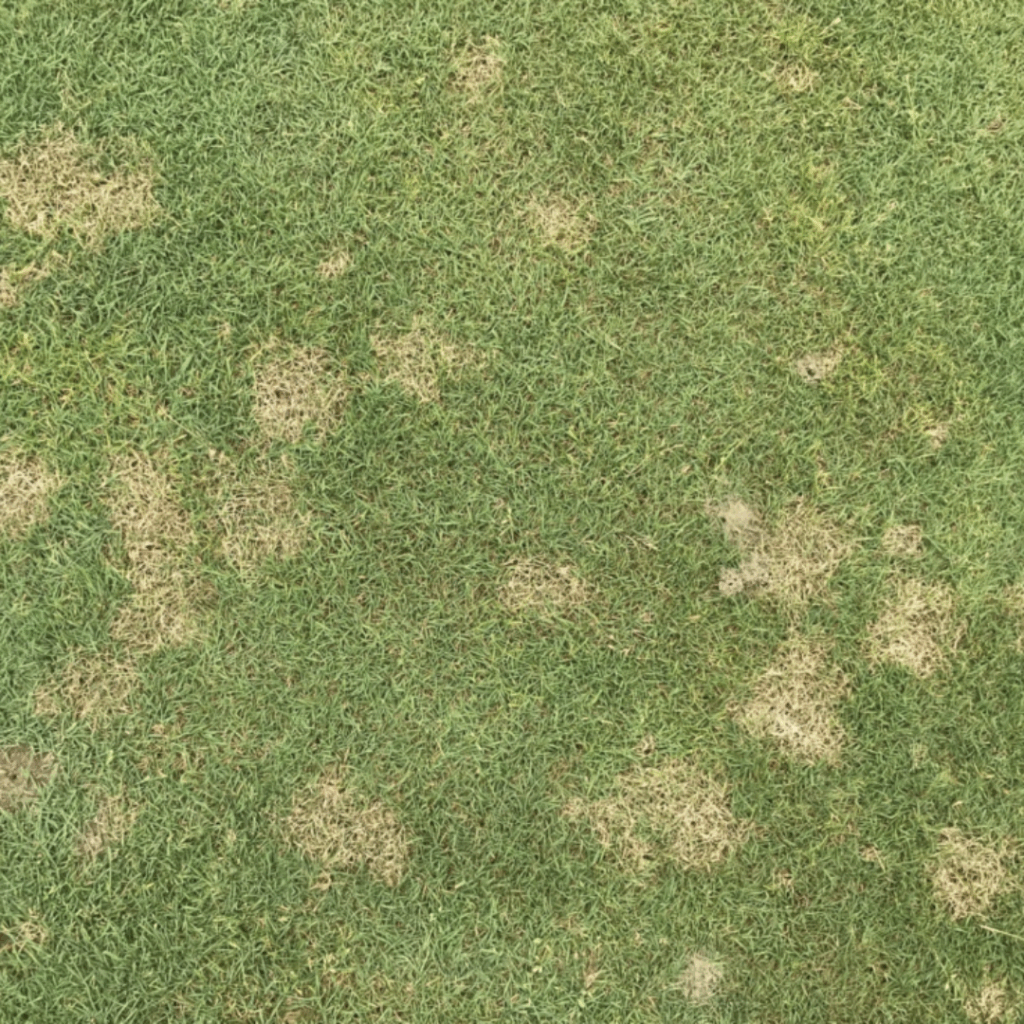When Heat and Humidity Create the Perfect Storm
Summers in the Detroit area bring long stretches of sunshine and warm evenings, but when temperatures rise and the air becomes heavy with humidity, lawns face a hidden threat: turf diseases. Unlike weeds or pests that you can spot right away, many lawn diseases sneak up quietly, leaving brown patches, thinning grass, or spots that spread quickly if not treated. This summer has been especially humid in Michigan, which means homeowners across Roseville and the greater Detroit region are seeing lawn diseases thrive.
Dollar Spot: The Most Common Culprit
One of the most frequent lawn problems in Michigan is Dollar Spot, a disease that thrives in hot and humid conditions. The name comes from the small, silver-dollar-sized patches it creates across your lawn. At first glance, you may think the grass is just stressed from the heat or not getting enough water, but Dollar Spot has a distinct look. The grass blades develop tan or straw-colored lesions with reddish-brown edges, eventually causing small patches of grass to wither. When left untreated, these patches multiply, creating a thin, unsightly lawn.
Dollar Spot tends to appear when daytime temperatures range from 70–90°F, paired with humid nights and morning dew. That describes a typical Detroit summer perfectly. The disease often worsens when lawns are mowed too short or when the soil lacks sufficient nitrogen.
Other Lawn Diseases That Thrive in Humid Summers
While Dollar Spot is the most common, it isn’t the only disease Detroit homeowners should watch out for. Other heat- and humidity-driven diseases include:
- Brown Patch: This disease causes large, irregular patches of brown grass. It thrives in the same conditions as Dollar Spot but can spread more aggressively across a lawn.
- Rust: Grass blades develop an orange or rust-colored powder that rubs off easily when touched. It often appears in late summer when lawns are under stress.
- Powdery Mildew: A white, powder-like substance coats grass blades, making lawns look dull and unhealthy. Shady, poorly ventilated areas of the yard are especially prone.
- Pythium Blight: Known as “grease spot” due to its oily, dark appearance on grass, this disease can spread rapidly under extreme humidity and warm nights.
Each of these diseases damages the lawn in different ways, but they all share one thing in common: they love hot, sticky Michigan weather.
Prevention Is the Best Defense
When it comes to lawn diseases, prevention is more effective (and less expensive) than treatment after the damage is done. Here are some strategies that help protect Detroit lawns:
- Water Smartly: Water early in the morning so grass has time to dry before nightfall. Evening watering creates prolonged moisture, which encourages disease.
- Mow at the Right Height: Cutting grass too short stresses it and makes it more vulnerable. Aim for about three inches to strengthen the lawn against disease.
- Fertilize Properly: A lawn lacking nitrogen is especially prone to Dollar Spot. Balanced fertilization helps grass fight off diseases naturally.
- Improve Airflow: Trim back trees and shrubs in areas where grass gets little air circulation, which reduces humidity buildup at the ground level.
- Schedule Professional Care: Lakeside pros know what signs to look for and can apply treatments or preventative measures before problems spiral.
Check out our coupons and special offers
Call the Experts Before Lawn Diseases Spread
Diseases like Dollar Spot and Brown Patch don’t just go away on their own, and the longer you wait, the harder it is to restore your lawn’s health. If you’ve noticed suspicious patches or unusual changes in your grass, now is the time to act. Lakeside Pro has the experience, tools, and treatments to stop lawn diseases in their tracks and help your yard recover before fall.
Don’t let Michigan’s hot, humid weather ruin your lawn. Call Lakeside Pro today at 586.445.2100 to schedule your lawn service and protect your yard all season long.

